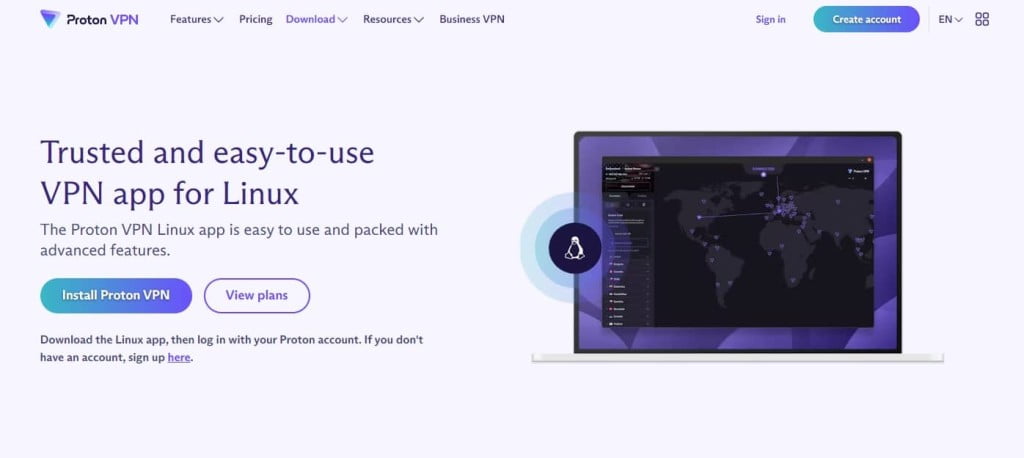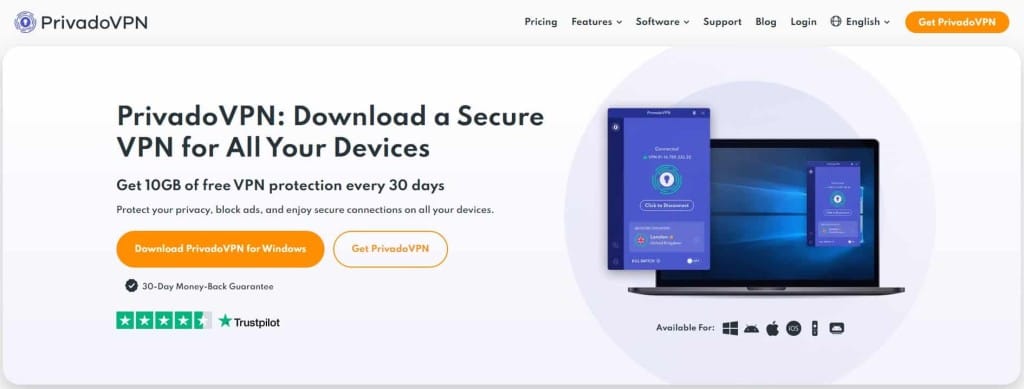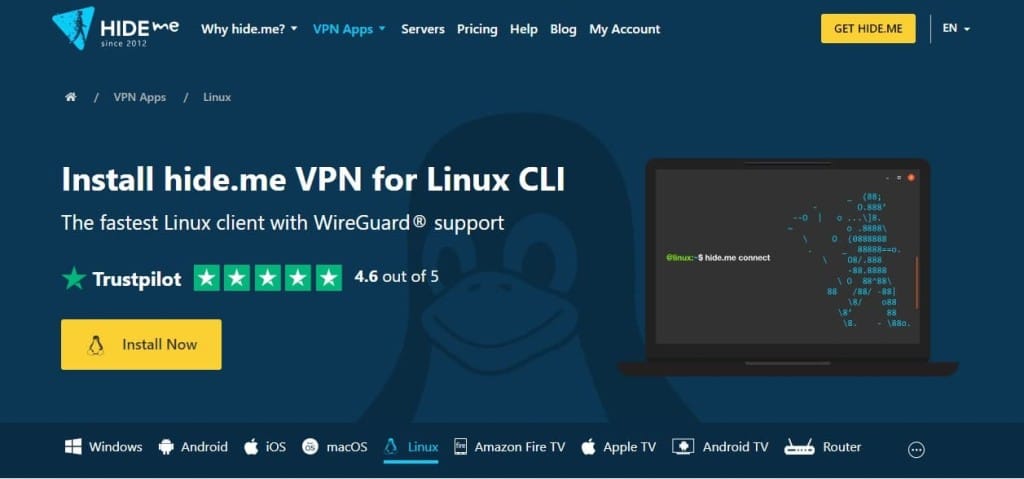As a Linux user you may pride yourself on being tech savvy and security conscious, but you should know that even the most secure operating systems benefits from an added layer of protection – this is where a free VPN for Linux device will be handy.
There are several free Linux VPN providers that offer robust security, decent speeds, and ease of use without costing a dime. And in this article, we’ll take a look at the best free VPN for Linux, exploring their key features, strengths, and potential drawbacks.
Whether you’re looking to enhance your privacy, bypass geo-restrictions, or simply browse the internet more securely, these VPNs provide a great starting point.
Best Free VPN for Linux
To save you time and effort, we’ve narrowed down the top free VPN that offer solid performance, security, and usability across different Linux distro. Here’s a quick summary of each, so you can easily choose the one that best fits your needs.
- Proton VPN: offers unlimited data and strong security features, making it perfect for extensive browsing without data caps.
- PrivadoVPN: provides fast speeds and 10GB of free data monthly, with a straightforward command-line interface for Linux users.
- hide.me: delivers fast speeds, 10GB of data per month, and robust security features, with support for multiple Linux distribution.
- Windscribe: offers 10GB of monthly data, access to servers in 11 countries, and a wide range of security features on Linux.
While each option has its strengths, the detailed sections below will give you a deeper understanding of what each VPN offers, helping you find the best fit for your needs.
1. Proton VPN

When choosing a reliable and feature-rich free VPN for Linux, Proton VPN app stands out as a top choice. It officially supports popular Linux distributions such as Debian, Ubuntu, and Fedora, and is known to work smoothly on many other systems as well.
This versatility makes Proton VPN an excellent option for a wide range of Linux users.
One of Proton VPN’s major strengths is its comprehensive support and guidance for Linux installations. Whether you’re using OpenVPN or WireGuard protocols, Proton VPN provides detailed setup guides, ensuring that even beginners can get started without hassle.
The installation process is straightforward, with DEB and RPM packages readily available, making it easy to set up on supported distributions.
Proton VPN also offers a user-friendly graphical interface for Linux PC, which is especially beneficial for users who may not be comfortable with the command line.
The Linux GUI includes features like a one-click “Quick Connect” button and the ability to create custom connection profiles, allowing users to tailor their Linux VPN experience to their specific needs.
One of the key advantages of Proton VPN is its unlimited data on the free plan. Unlike many other free VPNs that impose bandwidth restrictions, Proton VPN allows you to browse, stream, and download without worrying about hitting any data caps.
This unlimited data feature provides a worry-free experience for those who use the VPN frequently.
In terms of security, Proton VPN employs state-of-the-art measures to protect your data. It uses AES-256 encryption, a 4096-bit RSA key exchange, and HMAC with SHA384 for message authentication, ensuring that your online activities are secure.
Proton VPN maintains a strict no-logs policy, which means that your online activity remains private and is not tracked or stored. It also offers DNS leak protection by routing DNS queries through the VPN tunnel, preventing any potential leaks.
Additionally, the kill switch feature automatically blocks internet traffic if the VPN connection drops, preventing IP leaks.
Forward secrecy ensures that encryption keys are not reused, further enhancing security, while full disk encryption adds an extra layer of protection to server data.
Proton VPN also boasts high-speed servers, with a minimum bandwidth of 1 Gbps and many servers supporting up to 10 Gbps connections.
This ensures fast and reliable performance, even with the strong encryption standards in place, allowing users to enjoy a smooth and secure browsing experience.
Proton VPN
Get 70% Off
2. PrivadoVPN

PrivadoVPN is a strong contender among free VPN options for Linux users. It supports popular distributions like Ubuntu and Debian, and while it doesn’t offer a dedicated graphical interface for Linux, it makes up for it with a straightforward command-line interface, aka Linux CLI setup.
This setup is well-documented, with detailed guides available to assist users who may not be familiar with Linux. Using OpenVPN, PrivadoVPN ensures compatibility across various Linux systems, providing a reliable connection method for its users.
PrivadoVPN is known for its impressive speeds, which make it suitable for activities like browsing, streaming, and downloading. This performance is supported by the free plan, which provides access to servers in 12 locations.
Having access to multiple server location helps maintain good connection speeds and allows users to access content from different regions, an advantage over many other free VPNs that offer fewer server options.
With a generous offer of 10GB of free data each month, PrivadoVPN allows users to engage in substantial browsing, streaming, and downloading without immediately hitting a data cap.
However, heavy users who frequently stream or download large files might find this limit restrictive and may need to consider other options if they require more data.
In terms of security and privacy, PrivadoVPN uses 256-bit AES encryption to protect user data, ensuring that all internet traffic remains secure. Its strict no-logs policy guarantees that user activities are not tracked or stored, maintaining privacy and anonymity online.
Additionally, PrivadoVPN offers IP and DNS leak protection, which prevents exposure of real IP addresses and DNS queries, further safeguarding user anonymity.
Another important security feature is the kill switch, which automatically disconnects your internet if the VPN connection drops. This prevents any data from being transmitted without protection, ensuring your data remains secure at all times.
While the absence of a graphical user interface on Linux might be a drawback for some users, PrivadoVPN’s user friendly Linux CLI setup, robust security measures, and generous data allowance make it a compelling option for users seeking best Linux VPN.
Its fast speeds and diverse server locations offer a well-rounded experience for those looking for reliable online protection without a hefty price tag.
Privado VPN
Best VPN for streaming
3. hide.me

hide.me is a well regarded free VPN option for Linux device.
Why? It offers support for a variety of Linux distro including Ubuntu, Debian, and Fedora. The VPN can be set up using a command-line interface, which is both straightforward and well-documented.
This CLI setup includes essential features such as split tunneling, a kill switch, and DNS management, making it a versatile option for those who prefer command-line control.
Notably, hide.me’s Linux application is open-source and available on GitHub, allowing for community contributions and enhanced transparency.
One of the appealing aspects of hide.me is its free plan, which offers 10GB of data per month. This is relatively generous compared to many other free VPNs.
Additionally, the free plan includes the ability to unblock some streaming services, making it a good option for occasional streaming activities. Whether you’re catching up on your favorite shows or exploring new content, hide.me provides a solid foundation for streaming on a budget.
In terms of performance, hide.me is known for its fast speeds, with peak speeds reaching up to 880 Mbps using the WireGuard protocol. This ensures a smooth and lag-free experience, whether you’re streaming, browsing, or downloading.
The free plan offers access to servers in five locations, which is sufficient for basic needs and provides users with the flexibility to connect from different regions.
Security is a major focus for hide.me, which uses 256-bit AES encryption to protect user data and ensure secure internet traffic. The VPN maintains a strict no-logs policy, meaning it does not track or store any user activity.
This policy has been independently audited, providing an extra layer of trust for users concerned about privacy. The “StealthGuard” feature acts as a kill switch, disconnecting the internet if the VPN connection drops to prevent data leaks.
Additionally, hide.me offers protection against DNS, IPv6, and WebRTC leaks, ensuring that your real IP address is not exposed.
hide.me also includes additional features that enhance security and performance. The multihop feature routes your traffic through two VPN servers instead of one, providing an extra layer of security.
Obfuscation hides your VPN traffic to make it look like normal internet traffic, allowing the VPN to work effectively in restrictive countries. Lastly, the Bolt Technology feature aims to speed up VPN connections by sending traffic through TCP instead of UDP.
Although this feature is still under development and primarily available on Windows, it demonstrates hide.me’s commitment to innovation and improving user experience.
Hide.me
Protect your privacy effortlessly
4. Windscribe

Windscribe is a versatile and user friendly Linux VPN, offering a dedicated command-line application compatible with distributions such as Ubuntu, Fedora, Debian, and CentOS.
The installation process is simple, utilising .deb or .rpm packages, and the application features automatic updates that notify users of new versions, allowing for easy installations and ensuring the software remains current.
Windscribe’s free plan is particularly generous, providing users with 10GB of monthly data if they confirm their email, or 2GB without confirmation. This plan grants access to servers in 11 countries, including Canada, the USA, Turkey, Hong Kong, and Germany.
Notably, Windscribe does not impose a limit on the number of devices that can be connected simultaneously, even on the free plan, making it a flexible option for users with multiple devices.
In terms of security and privacy, Windscribe employs strong, industry-leading encryption to protect user data. The service maintains a strict no-logs policy, ensuring that users cannot be personally identified based on IP addresses and timestamps.
Additionally, Windscribe includes ad and tracker blocking features, allowing users to block specific IPs and domains across all devices.
Windscribe also offers several advanced features that enhance its functionality and user experience. The R.O.B.E.R.T tool is a customisable DNS and IP blocking tool that allows users to block various types of content, such as ads and trackers.
Split tunneling is available, enabling users to choose which applications use the VPN tunnel and which do not, providing greater control over their internet traffic.
For those who need a consistent online presence, Windscribe offers a static IP option, allowing users to use the same IP address every time they connect. Port forwarding is also supported, allowing remote access to internal resources on a local area network (LAN).
While streaming support is somewhat limited on the free plan, Windscribe can still unblock some streaming services, offering occasional streaming capabilities.
Users who require more extensive streaming options and unlimited data can upgrade their plan for as low as $3 per month. Additionally, Windscribe offers opportunities to earn extra data, such as by posting on social media, where users can earn an additional 5GB of data.
Windscribe
Get 58% off today!
How We Chose The Best Free VPN for Linux
Choosing the best free VPN for Linux required careful consideration of several key factors to ensure we identified options that truly meet users’ needs. We also reviewed user feedback and expert opinions to get a comprehensive understanding of each service.
Keep reading to see how these Linus VPN earned their spots on our list!
Real Support for Linux
When evaluating free Linux VPN, one of the most critical factors is ensuring real support across multiple Linux distributions. This means the VPN must be compatible with popular Linux distribution such as Ubuntu, Debian, Fedora, and others.
Supporting a wide range of Linux environments allows more users to enjoy the benefits of the VPN without encountering frustrating compatibility issues. It’s crucial that the VPN caters to the diverse nature of the Linux ecosystem, providing a seamless experience regardless of the distribution in use.
Ease of installation is another essential aspect of real support for Linux terminal. The VPN should offer a straightforward installation process that doesn’t require users to jump through hoops or engage in complex manual configurations.
Ideally, the VPN provides DEB or RPM packages for installation, making it simple for users to set up the software quickly. By focusing on ease of installation, VPN can ensure that even those who are not tech-savvy can easily get their systems up and running with the VPN, allowing them to focus on enjoying a secure and private internet experience.
A VPN with real support for Linux provides an experience that is as smooth and efficient as possible, letting users focus on their tasks without worrying about technical hurdles.
This support reflects a commitment to the Linux community and ensures that users receive the same level of functionality and security as those on other operating systems.
Security Features
Security features are the backbone of a trustworthy VPN, especially for Linux users who value privacy and data protection. The foundation of any reliable VPN is strong encryption standards.
A VPN must employ robust encryption, such as AES-256, to safeguard user data from prying eyes. This level of encryption is widely recognised for its strength and is trusted by security experts worldwide to keep information secure.
In addition to encryption, support for secure VPN protocols is essential for maintaining a secure connection. Protocols like OpenVPN and WireGuard provide the framework for how data is transmitted over the VPN.
OpenVPN is known for its reliability and security, while WireGuard offers modern cryptographic techniques and superior performance.
The availability of these protocols ensures that users can choose the best option for their specific needs and circumstances, maintaining a balance between security and performance.
Leak protection is also an integral part of a VPN’s security arsenal. A reliable VPN should provide protection against IP, DNS, and WebRTC leaks.
These types of leaks can inadvertently expose a user’s real IP address or other sensitive information, undermining the privacy that a VPN is supposed to provide.
By ensuring comprehensive leak protection, a VPN can offer users peace of mind, knowing that their online activities remain hidden and their privacy intact.
Privacy Policies
Privacy policies are a cornerstone of evaluating any VPN service, especially for users who prioritise online anonymity and data protection.
One of the most crucial aspects of a VPN’s privacy policy is a strict no-logs policy. This policy ensures that the VPN does not track or store any user activity, such as browsing history or connection timestamps.
By not retaining this data, the VPN guarantees that there is nothing to hand over to third parties or government authorities, even if such data is requested. Ideally, this no-logs policy should be independently audited to provide transparency and build user trust.
Independent audits offer a clear view into the VPN’s operations, verifying that the company genuinely adheres to its privacy commitments.
The jurisdiction in which a VPN operates also plays a significant role in determining its privacy capabilities. A VPN should ideally be based in a privacy-friendly jurisdiction that does not have mandatory data retention laws.
Countries with stringent privacy protections allow VPN providers to operate without the pressure of government surveillance and data-sharing agreements that can compromise user privacy.
Being based in such a location means that the VPN can uphold its no-logs policy without being forced to collect or share user information.
Performance
A high-performing VPN provider should offer fast and reliable speeds, even on its free plan. Users should be able to browse, stream, and download without significant slowdowns or interruptions.
Fast connection speeds ensure that users can watch videos without buffering, download files quickly, and browse the web seamlessly, all of which are essential for a satisfactory online experience.
The server network is another critical component of a VPN’s performance. A robust VPN should provide a good number of server locations on its free plan to ensure users can connect to servers that offer optimal performance.
A wide variety of server locations allows users to choose servers that are geographically closer to them, which generally results in better speeds and connectivity.
Additionally, having multiple server options can help users bypass regional restrictions and access content from different parts of the world.
With a well-distributed server network, users are less likely to experience congestion on the servers, which can lead to slower speeds and reduced performance.
By offering a diverse range of server locations, a VPN can provide consistent performance and meet the needs of users who require reliable and fast internet connections.
Data Allowance
Data allowance is a crucial factor to consider when evaluating free VPNs, as it determines how much you can use the service each month.
A VPN with generous data caps provides a substantial amount of free data, enabling users to browse, stream, and download without quickly hitting a limit.
For example, a data cap of 10GB per month is considered generous for free VPN services and is often sufficient for moderate browsing and occasional streaming. This allowance lets users enjoy the benefits of a VPN without worrying about running out of data before the month ends.
However, unlimited data on the free plan is even more desirable. VPNs offering unlimited data are highly preferred because they allow users to browse and stream as much as they want without worrying about exceeding any limits.
Unlimited data is particularly beneficial for those who rely heavily on VPNs for streaming or downloading large files, as it ensures uninterrupted access without the need to monitor usage.
Express VPN
ExpressVPN for Teams is built to solve the challenges of group security.
Key Things to Note About Free Linux VPN
While free Linux VPN can be a convenient option for budget-conscious users, it’s important to be aware of their limitations. Many free VPN service come with constraints such as data caps, fewer server location, and slower speeds compared to their paid counterparts.
These restrictions can impact the overall experience, especially for users who require extensive browsing, streaming, or downloading capabilities.
Additionally, caution is advised when using free VPN client, as some may compromise privacy and security. It’s essential to research and choose a VPN with a strong reputation and clear privacy policies to ensure your data remains protected.
Some free VPNs have been known to log user data or inject ads, which can undermine privacy and security.
Paid VPN like ExpressVPN, NordVPN, CyberGhost VPN, and Surfshark generally offer superior features and support for Linux user. These services typically provide faster speeds, a wider range of server locations, unlimited data, and robust security measures.
While they aren’t free, they deliver a more comprehensive and reliable VPN experience.
For those seeking the best security and features on Linux, a reputable paid VPN is often recommended. Investing in a paid service can provide peace of mind, knowing that your online activities are protected by top-notch encryption and privacy policies.
Ultimately, while free VPNs can be a good starting point, paid options are often the better choice for users who prioritise performance, security, and advanced features.
You might be interested: Top 5 Best VPNs for Ubuntu
Related Questions
Is there a free VPN on Linux?
There are several free VPN available for Linux. Notable options include Proton VPN, which offers unlimited data, strong security features, and supports various Linux distributions like Ubuntu, Debian, and Fedora with both GUI and CLI applications. Other good choices are PrivadoVPN, hide.me, and Windscribe.
Does Linux have inbuilt VPN?
Linux does not come with a built-in VPN. While Linux is a security-focused operating system, it requires external VPN software to enhance online privacy and security. Users can configure VPNs using protocols like OpenVPN or WireGuard through the Linux network manager or third-party VPN app.
Is Proton VPN free for Linux?
Yes Proton VPN is free for Linux. Proton VPN offers a free plan with unlimited data, no ads, and a strict no-logs policy, ensuring privacy and security. It supports popular Linux distributions such as Debian, Ubuntu, and Fedora, and provides an easy-to-use graphical interface and command-line options for installation and management.
Conclusion
Navigating the world of VPNs can be challenging, but finding the right free VPN for Linux doesn’t have to be. With a variety of options available, it’s crucial to choose a VPN that balances security, performance, and usability to meet your specific needs.
While free VPNs come with certain limitations, such as data caps and fewer server locations, they can still offer significant privacy and protection for your online activities.
For those who are new to VPNs or simply want a cost-effective way to enhance their online security, the free VPNs discussed in this post provide a solid foundation.
However, if you require more extensive features, faster speeds, or unlimited data, you might consider upgrading to a paid VPN service. In the end, only download VPN which will meet your requirements.
To recap, here is a list of the best free Linux VPN:
- Proton VPN: Offers unlimited data and strong security features, ideal for extensive browsing.
- PrivadoVPN: Provides fast speeds and 10GB of free data per month with a simple CLI setup.
- hide.me: Delivers fast speeds and robust security, with support for multiple Linux distributions.
- Windscribe: Offers 10GB of monthly data, server access in 11 countries, and strong security features.
Each of these VPNs offers unique benefits, so take some time to explore the detailed reviews above to find the best fit for your needs. With the right VPN, you can enjoy a more secure and private online experience on your Linux system.

